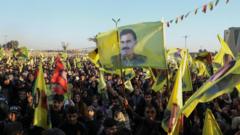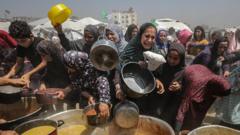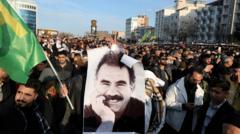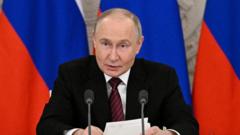Following Abdullah Ocalan's call for disarmament, the PKK's move to disband after four decades of conflict has been met with cautious optimism, mixed feelings, and unresolved questions about Kurdish rights and compensation.**
A Fragile Peace: PKK's Disbandment Sparks Mixed Reactions in Turkey**

A Fragile Peace: PKK's Disbandment Sparks Mixed Reactions in Turkey**
The decision to disarm by the PKK marks a pivotal moment in Turkey's long-standing conflict, yet skepticism and hope coexist among the Kurdish community.**
After enduring a brutal four-decade conflict that resulted in the loss of approximately 40,000 lives, the Kurdistan Workers Party (PKK) is set to disband, marking a significant turning point in Turkey's turbulent history. The PKK, a group recognized as a terrorist organization by Turkey and several western nations, has faced immense military pressure in recent years, leading to its leader Abdullah Ocalan's call for disarmament in February.
President Recep Tayyip Erdogan's government has welcomed the PKK’s decision as an important step towards a terror-free Turkey, but many within the Kurdish community remain skeptical about potential government actions in response to the disbandment. In the Kurdish-majority city of Diyarbakir, a starkly divided population reflects on the complex web of hopes, fears, and expectations that accompany these political developments.
Sitting in a local tea shop that bears the scars of past conflicts, Necmettin Bilmez, 65, expressed his doubts, voicing a sentiment shared by many: "They have been tricking us for thousands of years," he remarked, raising concerns around practical assurances of safety, rights, and recognition for the Kurdish people. In contrast, others like Mehmet Ek, 80, expressed relief and a desire for peace, wishing the disarmament had occurred much sooner.
While many in the community are eager for an end to bloodshed, calls for the release of jailed Kurdish politicians, alongside an amnesty for PKK fighters, resonate strongly in the streets. Ibrahim Nazlican, 63, described the conflict as a shared suffering, arguing that both sides are losing and emphasizing the need for resolutions that honor both Kurds and Turks.
Amid the still-raw memories of destruction—such as the remains of buildings ravaged by military confrontations in Diyarbakir—locals are grasping for a hopeful future. One crucial figure who remains a symbol of hope for many is Abdullah Ocalan, still imprisoned since 1999. His release, say supporters, is vital for establishing a foundation of true peace.
Among those bearing personal loss is Menice, 47, who mourns multiple family members killed in conflict, including her son. She holds onto hope that peace may finally arrive, asserting, "If our leader is not free, we will never be free."
The region’s shifting political landscape, particularly with neighboring countries in flux, adds a layer of complexity to the prospect of a durable peace. As both the Turkish government and the PKK seek advantageous negotiations, the enduring strife between the two has raised the stakes for upcoming elections and broader political stability.
In this delicate moment of potential reconciliation, both hope and skepticism hang in the air—reflecting the collective yearning for healing amid a history marked by pain. The outcome remains uncertain, as the desires for peace must confront a legacy of distrust. The call for unity and acknowledgment of shared humanity echoes through the hearts of those who have endured the tumultuous legacy of conflict.




















